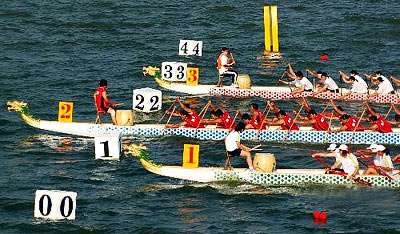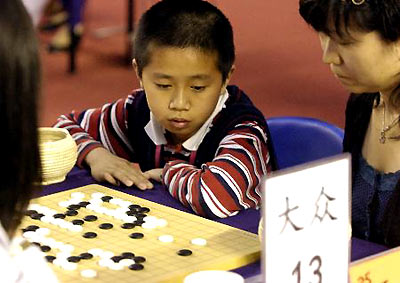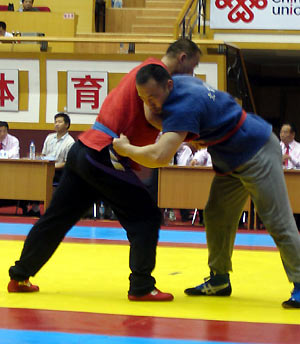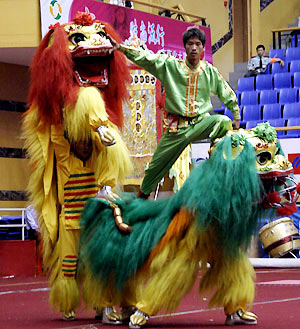| Tools: Save | Print | " target="_blank" class="style1">E-mail | Most Read |
| Dragon Boat, Lion Dance...Sports for All! |
| Adjust font size: |
|
The 10-day national sports carnival for non-Olympic events, the All-China Games, came to a close in Suzhou City of Jiangsu Province today, having attracted a record field of 4,085 athletes who were members of 55 delegations from different provinces, sports associations, universities and colleges as well as those from Hong Kong Special Administrative Region and Taiwan Province. Listed in the games program were 268 disciplines from 28 sports. In contrast to the quadrennial National Games, where only legitimate athletic sports made the schedule and which are recognized as a significant "home Olympics" for top athletes, the All-China Games give priority to promoting national physical fitness and providing lots of fun for amateur athletes. Last year, in the venue construction alone for the 10th National Games, host Nanjing spent a total of 10 billion yuan (US$1.2b) on building and restructuring 132 venues including an Olympic park which contains multi-storey stadiums and a stunning swimming complex. Despite looking a little bit humble especially when most of the Olympic title-holders are absent, the All-China Games focus on encouraging people to participate in sport rather than chasing medals, according to Feng Jianzhong, vice director of the State General Administration of Sports (SGAS). So there are no medal rankings.? Of the 55 delegations, 16 are sports associations working in professional trades like petroleum, mining and railways. The numbers taking part are 50 percent up on last year. "People show great interest in the games because we like the competitions available," said Tang Wei, under-secretary general of the Locomotive Sports Association. The All-China Games are popular among athletes, coaches and sports officials. An official at the Liaoning Sports Bureau said the investment proportion between mass sports and the local athletics stood at around 10:1. He considered it better to put more effort into developing community sports and improving the fitness of many than spending large sums of money on introducing a competitive element. Despite not keeping any real scorecards, the All-China Games still witnessed the inclusion of more sports than ever: 28 sports and 268 disciplines including bridge, fin swimming, the dragon boats and billiards. Most of these are regarded as typical sports-entertainment for ordinary people who enjoy participating in their spare time. In 2002 the number of activities was 17 and it reached 22 in 2004. In 1993 with a production line of professional Olympic athletes, the 7th National Games excluded all non-Olympic events (despite wushu) and many disciplines appeared to be under threat. Among the 1,093 world champions who appeared between 1979-1997, some 818 were non-Olympic titles, accounting for 74.8 percent. To better improve mass sports and offer space for these disciplines, the first All-China Games was introduced in 2002 in the city of Ningbo. Chinese wrestling, for instance, boasts a history spanning thousands of years, reaching its heights during the Song Dynasty (AD 960-1279), Qing Dynasty (1644-1911) and the 1950s. "The major idea of Chinese wrestling lies in stopping just an inch before the target, not like judo and modern wrestling which aim to overpower, and that reflects the traditional culture of China," said Sun Qingguo, former head coach of the Chinese wrestling national team. However, the discipline was eliminated by many local sports bureaus since its absence at the National Games in 1993. It almost disappeared before the first All-China Games was initiated. Some other traditional sports rescued include the lion and dragon dances and the dragon boats. Apart from the competition events, the All-China Games this year also provided a batch of events to attract more people to sports events. Such events included the Taihu Lake Sports Forum, the First Sports Festival for Middle-aged and Senior Citizens, and the Suzhou Fitness Month. According to the SGAS, the 4th All-China Games will be held in the city of Hefei in Anhui Province in 2010. More popular events will be included and it's believed to be capable of surpassing the National Games someday in the future, according to Feng Jianzhong. Sports included in the All-China Games: Lion Dance, Chinese Wrestling, Trampoline, Dance Sports, Bridge, Golf, Aerobics, Game of Go, Water Skiing, Parachuting, Body Building and Fitness, Billiards, Chess, Chinese Chess, Mountaineering and Climbing, Dragon Boad, Squash, Orienteering, Hobby Craft, Wireless Location Hunt, Bowling, Roller Sports, Open Water Swimming, Tug of War; Fin Swimming, Goal Ball, Boules.
(China.org.cn by Li Xiao, May 30, 2006) |
| Tools: Save | Print | " target="_blank" class="style1">E-mail | Most Read |
 |
| Related Stories |
|




